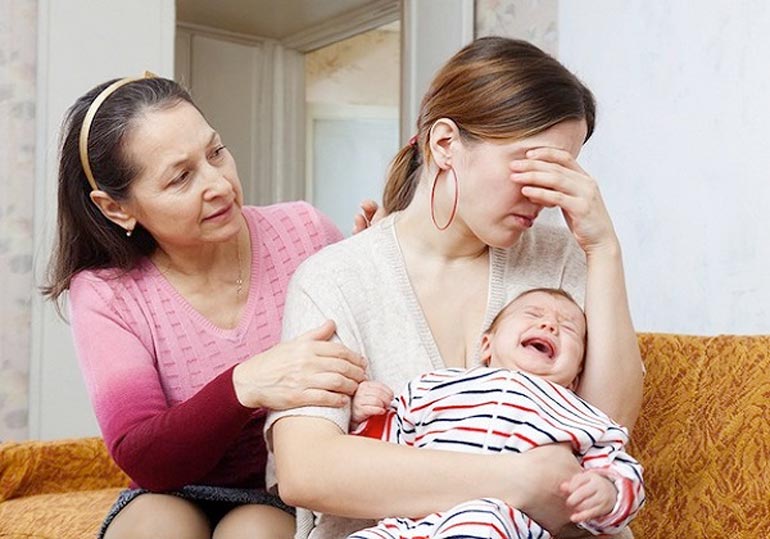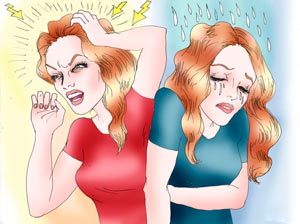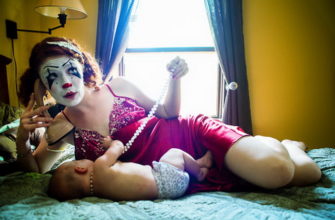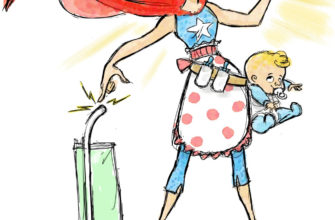In the first days after birth, some women may experience a rare mental disorder - postpartum psychosis. The disease is severe, but treatable. It is important to recognize the signs of a beginning disorder in time. Moreover, it can be a big surprise for relatives, appearing suddenly. Although a gradually developing psychosis is difficult to recognize immediately.
Postpartum psychosis is a rare mental disorder that usually occurs in the first 2-4 weeks after birth. With timely diagnosis and the rapid start of therapy, a woman can get out of this rapidly developing state in a few weeks, and with a delayed diagnosis, recovery can drag on for months. Often a woman suffering from postpartum psychosis does not realize her painful condition.

Causes of the disease
Little is known about the causes of the disease. Doctors are inclined to the fact that a sharp hormonal restructuring of the female body in the postpartum period can provoke the development of psychosis, complications during childbirth, and emotional stress from the birth of a child. The impetus can serve as a constant lack of sleep, severe fatigue of the mother.
Women whose relatives suffered from postpartum psychosis and women with bipolar depression or schizophrenia in their medical history are at greater risk of getting sick. If a woman after the first birth has already been diagnosed with postpartum psychosis, it is more likely that it will recur after the second pregnancy.
The use of narcotic substances can provoke the development of psychosis.
Everyone who has a high risk of getting sick should definitely consult a psychiatrist to minimize the likelihood of a disease.
Fortunately, postpartum psychosis is much less common than postpartum depression - it develops in approximately 0.1% of women in labor.
Signs of Postpartum Psychosis
 Contact a psychiatrist immediately if you have noticed the following symptoms in a woman who has recently given birth (literally in the first days after giving birth):
Contact a psychiatrist immediately if you have noticed the following symptoms in a woman who has recently given birth (literally in the first days after giving birth):
- A woman becomes distracted, cannot clearly express her thoughts. Periods of talkativeness are replaced by reluctance to communicate;
- Aggressiveness or euphoria alternate with depression, and mood changes occur quite sharply;
- The perception of taste and smell changes. It is even possible to refuse food;
- Insomnia. If a woman's sleep is disturbed, she does not want to go to bed, this should also alert relatives. She may develop delusional ideas and visions, auditory hallucinations;
- The woman has obsessions, she thinks that the baby is in danger, they want to take his life, to kidnap him. She does not allow anyone to the child, refuses to talk with people, is afraid to go out;
- Or vice versa, the child becomes hated by the mother, she is even able to try to kill him. And it may show complete indifference to him.The same attitude can be with people close to her.
The woman herself does not understand that she is sick, completely inadequate, therefore her relatives should take care of her and show the psychiatrist.
It is necessary to take this disease seriously. After all, a sick person, not receiving the necessary treatment, can not only harm herself and the child, but also deprive herself and his life.
Treatment
At the first suspicion of a disease be sure to consult a psychiatrist. He will examine the patient, prescribe the necessary treatment for her.
Most often, a sick woman is put in a hospital. If the clinic has conditions, then the baby is next to her mother. Basically, there are no such wards in the hospital, so the baby is at home with one of his relatives. If the child is with his mother, then breastfeeding is prohibited during treatment, because his mother receives strong antipsychotic drugs, various mood stabilizers (normotics).
Usually the patient’s condition improves after a couple of weeks so that she can be discharged for aftercare home. A full course of treatment can last from six months to a year.
Relatives and friends will require a lot of strength and patience:
- It is necessary to provide comfortable conditions for a sick mother that promote recovery: peace, the ability to relax more;
- Most of the household chores will have to be taken over by the husband and other family members;
- During the course of treatment, one of the relatives should take care of the baby, this cannot be done by the mother herself;
- Temporarily limit meetings at home with friends - it’s not time for guests yet.
- Try to morally support the woman, talk with her calmly, benevolently, without reproaching what has happened. Indeed, in what happened, the woman herself is not guilty;
- If possible, do not leave her alone;
- Monitor medication, dose and timing;
- Provide a full 8-hour sleep.
Effects
If you do not start treatment on time, the consequences of a formidable disease can be disastrous. Being in a state of psychosis, a woman does not control her actions, is captive to obsessions. There are cases when a mother who just gave birth, without receiving timely treatment and being in a manic - depressive state, made suicide attempts. And not all of them, unfortunately, were prevented.
My friend, who suffered postpartum psychosis, recalls that time as a nightmare. Her birth was premature, difficult, obviously, this contributed to the development of the disease.
She says that she suddenly became irritable, screaming at everyone, everyone suddenly became enemies. I even had a fight with my mother-in-law. She wrote some inarticulate, incomprehensible notes. Everything around him became a stranger, life seemed over. It seemed to her that the vitality had left her. Tasting sensations completely disappeared. Because of this, she refused to eat in the hospital. They fed her forcefully from a spoon. How I ended up in the hospital - I don’t remember at all. The treatment dragged on for six months.
Three years have passed, and she and her husband want a second child. That's just a friend is afraid of a recurrence of the disease. Therefore, she and her husband turned to the psychiatrist who treated her. Now the woman is following all the doctor’s recommendations and hopes that the terrible disease will not recur.
If you could not avoid the disease, and postpartum psychosis still manifested, do not despair. Remember - life goes on. It is very important to be attentive to a newly born woman. Take care of her, help in household chores. Surround her with love. To enable mommy not to overload, relax more often. And then the formidable ailment will recede and will be remembered simply as a terrible nightmare.
Read more about postpartum depression – 10 tips to get rid of depression after childbirth
What you need to know about postpartum depression – 9 questions exciting young mothers









Hello! Unfortunately, I have experience with postpartum psychosis. Thanks to my beloved that he suffered all this and provided me with the peace I needed.
Good day. Thank you for the written article, I carefully read everything, and judging by all the signs, after the birth I was ill with this particular disease. But I didn’t go anywhere, and all this disappeared as it were. The main thing is that everything was calm at home, without too much noise and a bunch of guests. 🙂
Yes, this is sometimes shown in Brazilian TV shows. A terrible state. In this case, it seems to me that most of all should be feared for the health and life of the child. Here he is definitely not to blame for anything - neither in the heredity of the mother, nor in her taking drugs before childbirth. The main thing is to have the opportunity to refer a woman to a good doctor for treatment. After all, such a specialization of doctors in their own psyche often leaves a bad imprint. After all, it will only be worse if, instead of normal help, a woman receives only tons of harmful drugs that turn her into a plant. Moreover, knowing the situation and the spectrum of communication in such institutions, we can safely say that all this will only harm. Therefore, if you need a result, you should strain and find a worthy specialist and, preferably, a private clinic, which will more resemble a boarding house, rather than a typical madhouse.
We did not have to deal with postpartum psychosis, but depression was very severe. Complicates all the fact that a woman has no time to engage in herself, all the strength and attention are directed to the little man. But you need to understand that the child first of all needs a healthy and happy mother, so you need to find the time and energy to undergo treatment.
I heard about postpartum depression, and even experienced on myself after the birth of my first child. But I never thought that the more severe form, namely postpartum psychosis, is such a terrible disease that affects both the woman herself and everyone around her. Well, if loved ones understand, help, but unfortunately this is not always the case, and cases with a tragic outcome continue to occur.
I did not have all of the above symptoms, well, if only distraction, but I know for sure that I experienced postpartum psychosis and my family survived it with me. I was very hot-tempered. The main thing is to pull yourself together, try to relax more, even if it is difficult and there are no relatives nearby. You just need to spit on all other matters, even if the flood, the main thing is your calm and serenity. I began to go outside and try to walk longer with the child, and he is calmer and mom can relax. Well, nobody has yet canceled the valerian.